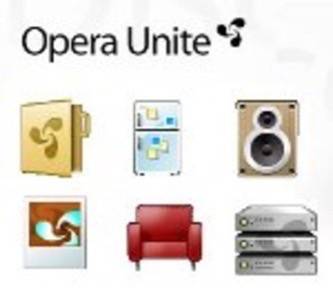In a recent interview with Network World, Opera CEO, Jon von Tetzchner, defends the company’s upcoming web browser (Opera 10)’s “Unite” feature – the new technology that turns your browser into a web server. He said that Unite’s decentralized nature makes it more difficult for hackers to break into computer systems – not easier.

That claim is probably meant to fight back against some people’s initial concerns that hosting files on their own PC will leave them open to attack. However, simply addressing security issues is somewhat missing the point about the real trouble with Unite: it’s not solving a problem we actually have.
Opera Unite: Just as Secure as Anything Else, We Promise
According to the interview, Tetzchner addresses the concerns of those in the security community who fear this technology that aims to put a web server on every PC. He says, “when you’re hacking a single system, if you have everything that belongs to everyone in one location, you only need to break in once. If you have it in different computers it’s a little more complicated. If you get into one Web server and everyone’s data is in there, that’s easier than getting into a million computers.”
While Opera and the tech community continue to debatethe technology’s security or lack thereof, the rest of the tech early adopters have simply moved on. Outside of the Opera fanatics (we know who you are!), most of us either skimmed the news briefly or, at the most, may have downloaded the alpha and played with it for a bit. But did the lot of us switch browsers and start sharing files? No.
Why is that? Shouldn’t this be just the sort of thing that has techies all a’twitter? What’s going on?
Where’s the Geek Love?
When Opera revealed the mysterious (and perhaps overly-hyped) Unite, they probably didn’t get the response they expected. After numerous emails and teases about a new technology that was going to “reinvent the web,” for the most part, the community response was “huh?”
Oh sure, Opera fanboys and girls got it right away as did web developers and other geekier-than-thou folks, but even within the tech community itself, therewasconfusion…and a bit of “bah humbug” too.
We remember reading through various blog comments where users dismissed Unite as nothing more special than a browser with P2P plugins – a statement that’s only true to a point. While the technology enables P2P between browsers, it does so via a proxy server in the middle at operaunite.com. That middle service could easily be a single point of failure for the Unite infrastructure. Opera Unite’s proxy goes down, you go down. Sure, that might not be any different than the cloud services we rely on now: Gmail, Flickr, Facebook, YouTube, etc. However, even if one of those was to crash-and-burn, it wouldn’t take our whole web of services down with it.
But Unite wants to replace just about every cloud app you use today with its own apps for file sharing, social note-posting, chat, photo sharing, and media playing…and that’s not to mention how Unite wants to let you host your own web server, too. In other words, Opera wants to (partially) move the cloud back off the the web to your PC.
They even go so far as to claim that their single point of failure is an improvement on what we do today: “We place our trust in these third parties, and we hope for the best, but as long as our own computers are not first class citizens on the Web, we are merely tenants, and hosting companies are the landlords of the Internet,” writes product analyst Lawrence Eng.
Thanks, but we’ll take our numerous cloud apps over the Unite+PC combo any day.
What Problem Does Unite Solve?
When we started moving from desktop to web, initially testing the waters with email services, later moving to photo and video sharing services, and finally to social networking sites like Facebook that let us communicate and share media, the solutions being implemented were solving real challenges. Setting up desktop email was hard for non-techies (what’s my email server’s address? what’s SMTP?). There were mailbox storage limits and attachment size limits. Letting grandma and grandpa see our digital photos wasn’t easy. Getting in touch and staying in touch with our wide network of friends was downright impossible. But then these web applications came along and made it possible for everyone to use technology. They were simple, straightforward, and fun. And soon a Web revolution was underway. A real one, that is.
What problem does Opera Unite solve that could kick off the next revolution of the web? Are we having trouble with cloud services? Are we concerned that they’re so insecure that moving everything via P2P through Opera is somehow better? Is Unite easier than Facebook? Than flickr? Heck, than email? No.
It’s not easier for us techies by any means (especially since its tied to one browser) and it’s not even close to being easy for the “regular folks” of the online world…you know, the ones who don’t even know what a browser is
So security concerns aside, what is Unite doing for us that we can’t get elsewhere? Anyone?
If you think we’re missing the point, chime in below.

















